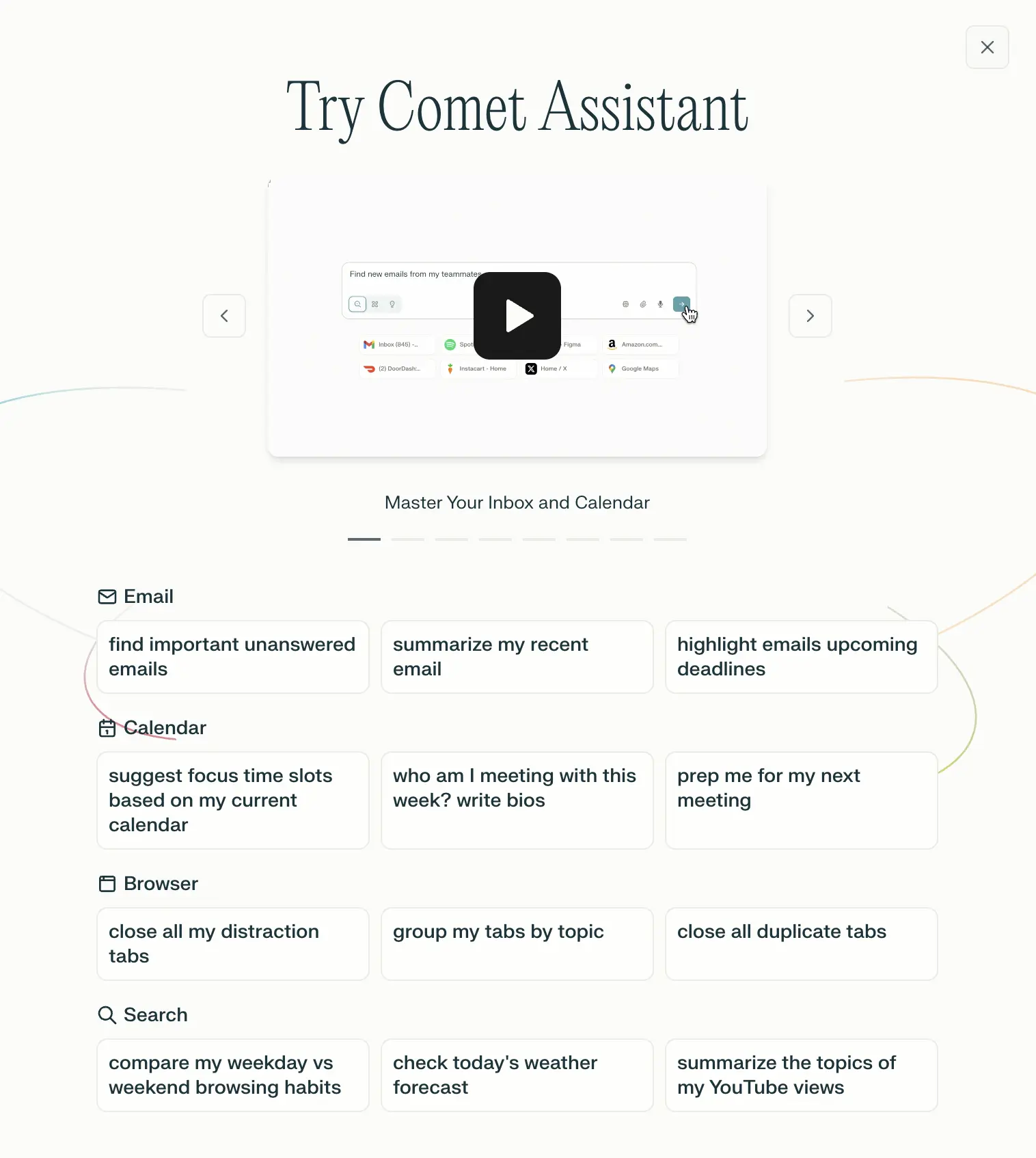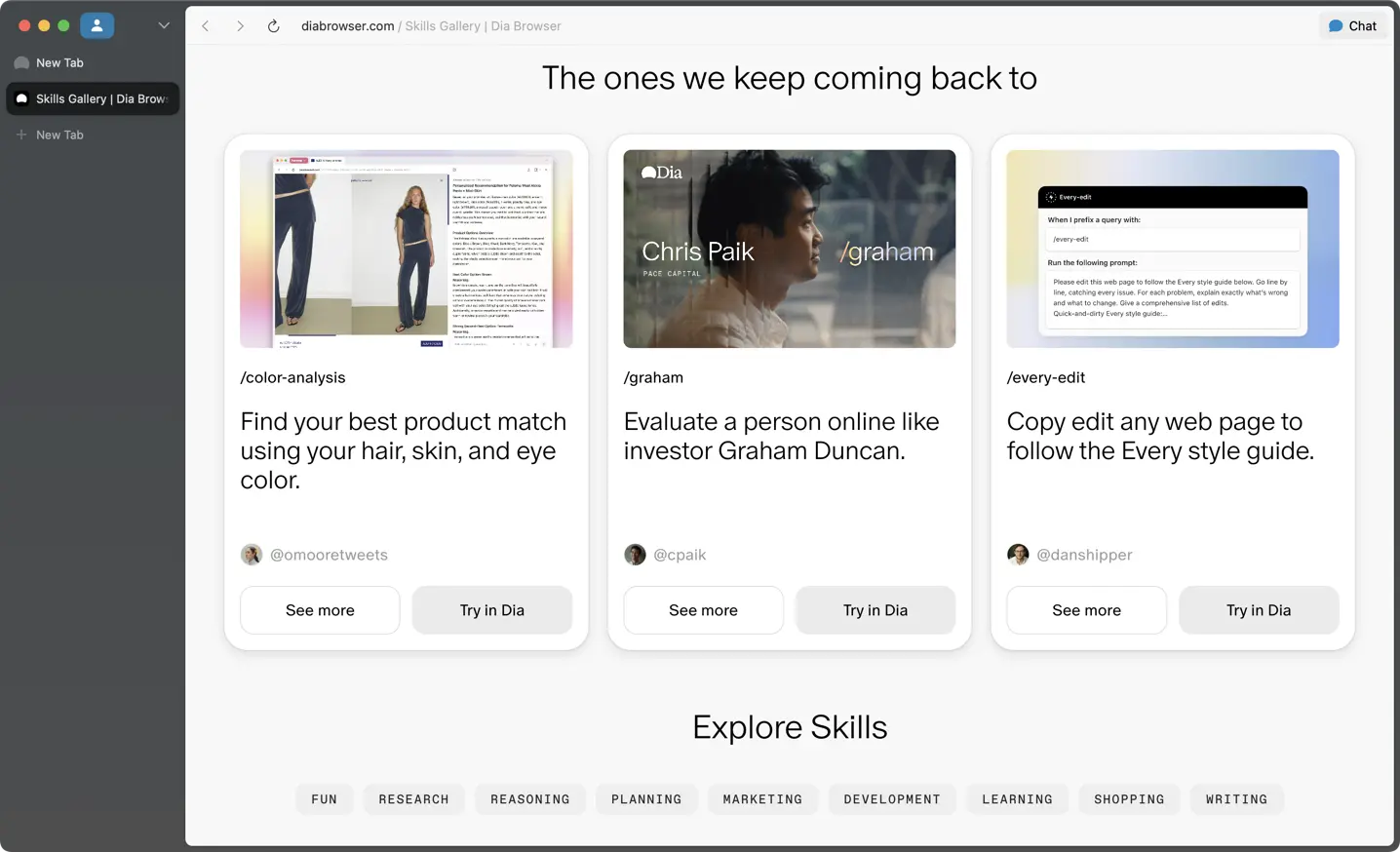
Comet is the AI browser you start with because it gives you the most raw power for free, full agentic actions, Perplexity built in, and ridiculously good research tools that blow Google out of the water. It can actually click around the web for you, fill forms, test promo codes, and summarize anything you’re looking at, which makes it the best no-cost option by far (even if it sometimes misfires or moves slow). For deep research, we recommend Comet.
Dia, on the other hand, isn’t trying to win on research, it's the productivity browser, especially if they will bring back Arc's side bar. It's AI is lighter, and doesn't have agent control.
If you're looking for the best research/shopping browser, Comet wins. If you just want a pretty designed browser, with light AI features, then use Dia.
We believe there are better options available in this category, read below to learn what this software does well, and what they could do better. ⤵
Comet has more promise at the moment. With Perplexity at the core, integration with email and calendar, plus the ability to actually take over and click around for you, makes Comet feel a bit more futuristic as to what a browser can be.
Comet can interact with open tabs, clean up and group tabs, similarly to Dia. That said, Comet allows you to actually talk with your browser via a voice assistant, and even navigate the pages your on at times, showing you a deeper layer of browser interaction that you don't get with Dia.
Right now Dia allows you to reference your history with @history, allowing it to go a bit deeper on personalization based on your prior searches and pages visited. Comet doesn't go too deep into history or memory as of now, bup Perplexity has said that they are diving more into memory in the future (which will make its way into Comet).
Dia has skills that you can trigger with /skillname which are effectively pre-set prompting before a search is sent or chat is completed. They also have a marketplace where you can grab these skills (prompts) and modify them for your own usage. It's definitely a standout feature.
Perplexity knows how to make money and has way more resources, so I believe they'll actually have a sustainable business model (they already do). That means they'll be able to do more and figure out how to monetize the browser effectively.
Perplexity is a search engine that's already good, and I use it alongside ChatGPT. Dia is mostly using an OpenAI wrapper (and Anthropic) for their search, so I'm just generally less bullish because I find myself missing both Perplexity and ChatGPT when using Dia, they just have less IP as a whole.
With all of that said, Perplexity is already a fantastic search engine. So taking that and building a browser around it makes a lot of sense. In-fact, it's getting me even more excited for OpenAI's upcoming browser as they are leading the charge when it comes to chat and search.
I'm unsure if just pure product and design quality can win in this space. Love how Dia looks and the team behind it is exceptional, just not totally sure if it's enough being more of a wrapper of these other AI tools at the core.
.svg)

.webp)
.webp)
.webp)
.webp)
.webp)



A browser for agentic search by Perplexity.
Comet Browser is an AI-native browser created by the team over at Perplexity, who has been shaking up the search space. The main differentiator with Comet is that their Comet Assistant is at the core, which gives us a taste of what's coming with the coined term "Agentic Browsing". All that really means is that the assistant not only searches with more context and interacts with your tabs, but it actually clicks around the web for you.
Out of all the AI browsers, I trust Comet the most for deep research where I actually need factual information. The reason is because Comet is the most connected to the internet and it gives you clear citations of where it gets it's information from (while ChatGPT can make things up sometimes). So if I am looking for facts, data, sources, I always open up Comet.
Not to mention, I love Comet's Android browser. I can actually use the AI Assistant on mobile, it can look for promo codes (so I can finally shop on my phone), and agent mode works on the phone too 🤯 It has immediately become my main browser on my phone. It's not available for iOS yet, only Android.

Comet Browser’s agent mode is completely free, unlike other AI browsers where you need to be on a paid plan to unlock agent capabilities so even if it doesn't become your one and only browser, it's incredibly handy to have on your devices (click here to grab it).
Comet's built-in assistant is what sets it apart from all the best browsers we've covered. It handles the new table-stakes well, with Perplexity at the core, so all the usual search and research functionality is handled.
It can also interact with open tabs, allowing you to essentially target your search and research to a more specific dataset to what you're looking into. But Dia can do this as well, so it's not particularly standout in a browser.
But what does set it apart is Comet gives us the first actual glance at what this coveted "Agentic Browsing" experience actually is, in a non-technical, actually user-friendly way.
What does this mean? Well it can connect into your calendar and email to tell you about important emails (cool, like Google Assistant, right?), but most impressively it can even navigate the web for you.
I'm saying that you can ask it to do things, and it will actually navigate around the page your on, open new pages when needed, and take action as if it's a human you're asking to do something for you.

With all of that said, moving into the browser space is incredibly difficult, but there is something incredibly interesting about this new wave of AI browsers, and we're totally here for the browser space to finally evolve.

.webp)
.webp)
.webp)
.webp)
.webp)



AI won’t exist as an app. Or a button. It’ll be an entirely new environment — built on top of a web browser.
Dia Browser is the latest project from The Browser Company (the same team behind Arc Browser), and while it’s an interesting experiment, it feels more like a stripped-down Chrome with an AI sidekick than an actual serious browser contender.
The Browser Company was acquired by Atlassian for $610M, where they will continue building both browsers (focusing on Dia) but with more financial backing to hire more. Although typically acquisitions by the likes of Atlassian have led to stagnation (e.g. Loom). We're cautiously optimistic about this one though since the agentic browser space requires so much financial backing, with Comet by Perplexity investing billions into building out their competitor to Dia.
Dia is for those who are super excited about agentic browsers (think of a baked-in AI chat sidebar, that can co-pilot the browser with you at times).
If you're someone that likes the idea of being able to have pre-built prompts that can be ran that interact with and take into consideration the content on the page you're visiting, then you'll love their "Skills" functionality (this will either immediately click for you as to what's possible, or not):

Sorta. The main competition going on right now is between Perplexity's Comet vs Dia. And while I see some promise behind Dia, I am definitely finding myself only using it for some personal searching. Like going in the depths on researching to buy something. It hasn't been able to replace Arc Browser as my day-to-day work and productivity-focused browser.
It's also incredibly difficult for me to break the habit (or even want to) use ChatGPT less (I use the desktop app, triggering it with CTRL + spacebar), and it seems the team really wants you to embrace their AI chatbot in-place of ChatGPT to get the full benefits (of getting your browser to learn and understand you.
With all of that, if you’re someone who just wants a clean browser with built-in AI to summarize articles or answer questions, speak to your open tabs and YouTube videos to help with research, then sure, Dia might be worth giving a shot. But if you actually care about productivity, speed, and having real control over your setup, Arc still feels lightyears ahead (yes, even in maintenance mode). It's clear that Dia was built for a totally different audience (e.g. my parents or those who haven't taken to embracing AI just yet, then absolutely yes, Dia feels like a solid gateway into this).


.webp)
.webp)
.webp)
.webp)
.webp)
